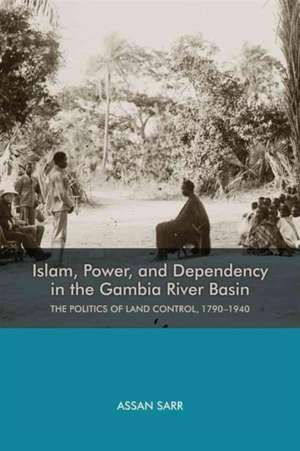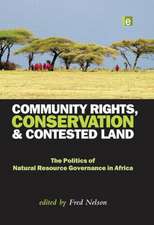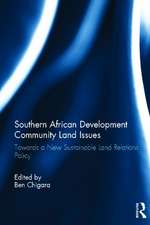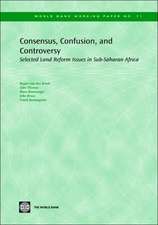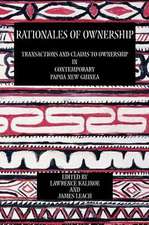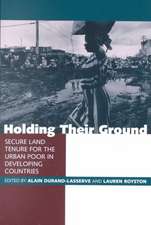Islam, Power, and Dependency in the Gambia River – The Politics of Land Control, 1790–1940: Rochester Studies in African History and the Diaspora
Autor Assan Sarren Limba Engleză Hardback – 14 dec 2016
Author Assan Sarr argues for a nuanced understanding of land and its historic value in Africa. Moving beyond a recognition of the material value of land, Sarr'sanalysis highlights its cultural and social worth, pointing out the spiritual associations the land generated and the ways that certain people gained privileged access to those spiritual powers. By emphasizing that the land aroundthe Gambia River both inspired and gave form to a cosmology of ritual and belief, the book points to what might be considered an indigenous tradition of ecological preservation and protection.
Assan Sarr is assistant professor of history at Ohio University.
Din seria Rochester Studies in African History and the Diaspora
-
 Preț: 275.40 lei
Preț: 275.40 lei -
 Preț: 255.53 lei
Preț: 255.53 lei -
 Preț: 236.07 lei
Preț: 236.07 lei -
 Preț: 452.55 lei
Preț: 452.55 lei -
 Preț: 382.23 lei
Preț: 382.23 lei -
 Preț: 272.30 lei
Preț: 272.30 lei - 23%
 Preț: 753.30 lei
Preț: 753.30 lei - 23%
 Preț: 892.40 lei
Preț: 892.40 lei - 23%
 Preț: 727.23 lei
Preț: 727.23 lei - 19%
 Preț: 647.70 lei
Preț: 647.70 lei - 19%
 Preț: 646.91 lei
Preț: 646.91 lei - 23%
 Preț: 896.57 lei
Preț: 896.57 lei -
 Preț: 223.44 lei
Preț: 223.44 lei - 19%
 Preț: 676.40 lei
Preț: 676.40 lei - 23%
 Preț: 748.86 lei
Preț: 748.86 lei - 19%
 Preț: 647.22 lei
Preț: 647.22 lei - 23%
 Preț: 894.02 lei
Preț: 894.02 lei -
 Preț: 385.42 lei
Preț: 385.42 lei -
 Preț: 227.09 lei
Preț: 227.09 lei - 23%
 Preț: 728.11 lei
Preț: 728.11 lei - 19%
 Preț: 646.60 lei
Preț: 646.60 lei - 23%
 Preț: 727.94 lei
Preț: 727.94 lei - 19%
 Preț: 645.19 lei
Preț: 645.19 lei - 19%
 Preț: 641.93 lei
Preț: 641.93 lei -
 Preț: 291.49 lei
Preț: 291.49 lei -
 Preț: 303.50 lei
Preț: 303.50 lei - 23%
 Preț: 727.07 lei
Preț: 727.07 lei - 23%
 Preț: 727.23 lei
Preț: 727.23 lei - 19%
 Preț: 645.98 lei
Preț: 645.98 lei - 19%
 Preț: 645.82 lei
Preț: 645.82 lei - 23%
 Preț: 890.63 lei
Preț: 890.63 lei -
 Preț: 302.19 lei
Preț: 302.19 lei - 23%
 Preț: 756.28 lei
Preț: 756.28 lei - 23%
 Preț: 893.73 lei
Preț: 893.73 lei - 23%
 Preț: 695.80 lei
Preț: 695.80 lei - 19%
 Preț: 645.98 lei
Preț: 645.98 lei -
 Preț: 393.70 lei
Preț: 393.70 lei - 19%
 Preț: 644.88 lei
Preț: 644.88 lei - 23%
 Preț: 694.29 lei
Preț: 694.29 lei - 23%
 Preț: 727.23 lei
Preț: 727.23 lei - 23%
 Preț: 757.90 lei
Preț: 757.90 lei - 23%
 Preț: 894.78 lei
Preț: 894.78 lei -
 Preț: 260.19 lei
Preț: 260.19 lei -
 Preț: 301.38 lei
Preț: 301.38 lei -
 Preț: 263.29 lei
Preț: 263.29 lei - 19%
 Preț: 653.78 lei
Preț: 653.78 lei -
 Preț: 414.86 lei
Preț: 414.86 lei
Preț: 449.31 lei
Nou
Puncte Express: 674
Preț estimativ în valută:
85.97€ • 89.76$ • 71.16£
85.97€ • 89.76$ • 71.16£
Carte tipărită la comandă
Livrare economică 05-19 aprilie
Preluare comenzi: 021 569.72.76
Specificații
ISBN-13: 9781580465694
ISBN-10: 1580465692
Pagini: 258
Dimensiuni: 162 x 234 x 22 mm
Greutate: 0.55 kg
Editura: University of Rochester Press
Seria Rochester Studies in African History and the Diaspora
ISBN-10: 1580465692
Pagini: 258
Dimensiuni: 162 x 234 x 22 mm
Greutate: 0.55 kg
Editura: University of Rochester Press
Seria Rochester Studies in African History and the Diaspora
Notă biografică
Assan Sarr
Cuprins
Introduction The Founding of Mandinka Settlements Land and the Politics of Exclusion The Power of the Wild Spirits The End of Soninke Rule Spiritual Persistence though Change The Politicization of Chieftaincy Conclusion Notes Bibliography Index
